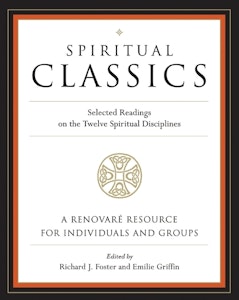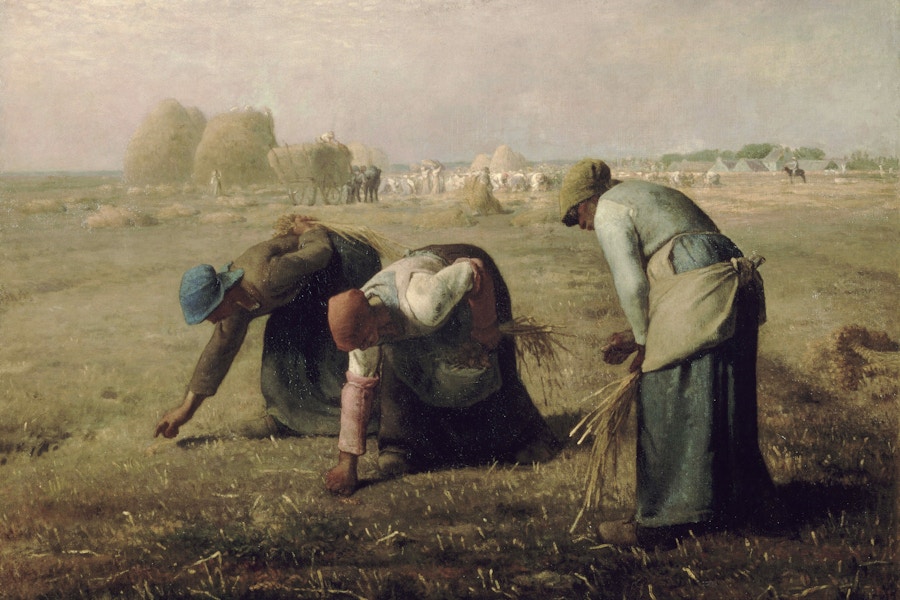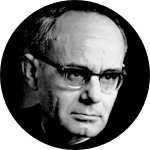 Excerpt from Spiritual Classics
Excerpt from Spiritual Classics
I should like to bring the routine of my daily life before You, O Lord, to discuss the long days and tedious hours that are filled with everything else but You.
Look at this routine, O God of Mildness. Look upon us men, who are practically nothing else but routine. In Your loving mercy, look at my soul, a road crowded by a dense and endless column of bedraggled refugees, a bomb-pocked highway on which countless trivialities, much empty talk and pointless activity, idle curiosity and ludicrous pretensions of importance all roll forward in a never-ending stream.
When it stands before You and Your infallible Truthfulness, doesn’t my soul look just like a marketplace where the second-hand dealers from all corners of the globe have assembled to sell the shabby riches of this world? Isn’t it just like a noisy bazaar, where I and the rest of mankind display our cheap trinkets to the restless, milling crowds?
The Warehouse of My Soul
Many years ago, when I was a schoolboy distinguished by the name of “philosopher,” I learned that the soul is somehow everything. O God, how the meaning of that lofty-sounding phrase has changed! How different it sounds to me now, when my soul has become a huge warehouse where day after day the trucks unload their crates without any plan or discrimination, to be piled helterskelter in every available corner and cranny, until it is crammed full from top to bottom with the trite, the commonplace, the insignificant, the routine.
What will become of me, dear God, if my life goes on like this? What will happen to me when all the crates are suddenly swept out of the warehouse? How will I feel at the hour of my death? Then there will be no more “daily routine” then I shall suddenly be abandoned by all the things that now fill up my days here on earth.
What Final Yield?
And what will I myself be at that hour, when I am only myself and nothing else? My whole life long I have been nothing but the ordinary routine, all business and activity, a desert filled with empty sound and meaningless fury. But when the heavy weight of death one day presses down upon my life and squeezes the true and lasting content out of all those many days and long years, what will be the final yield?
Maybe at that last reckoning, at the time of the great disillusionment that will take the place of the great illusion of my tritely spent earthly life, maybe then, O God, if you have been merciful to me, the genuine yield of my ungenuine life will be only a few blessed moments, made luminous and living by Your grace. Maybe then I shall see the few precious instants when the grace of Your Love has succeeded in stealing into an obscure corner of my life, in between the countless bales of second-hand goods that fill up my everyday routine.
Escaping From My Exile
How can I redeem this wretched humdrum? How can I turn myself toward the one thing necessary, toward You? How can I escape from the prison of this routine? Haven’t You Yourself committed me to it? And didn’t I find myself already in exile, from the very first moment I began to realize that my true life must be directed toward You? Wasn’t I already deeply entangled in the pettiness of everyday cares when it first dawned on me that I must not allow myself to be suffocated under the weight of earthly routine?
Aren’t You my Creator? Haven’t You made me a human being? And what is man but a being that is not sufficient to itself, a being who sees his own insufficiency, so that he longs naturally and necessarily for Your Infinity? What is man but the being who must follow the urge to run toward Your distant stars, who must keep up his chase until he has covered all the highways and byways of this world, only in the end to see your stars still coursing their serenely ordered way — and as far away as ever?
What Would Lift Me?
Even if I should try to escape from my routine by becoming a Carthusian, so that I’d have nothing more to do but spend my days in silent adoration of Your holy presence, would that solve my problem? Would that really lift me out of my rut?
I’m afraid not, since not even the sacred actions I now perform are free from the corrosive dust of this spirit of routine. When I think of all the hours I have spent at Your holy altar, or reciting Your Church’s official prayer in my Breviary, then it becomes clear to me that I myself am responsible for making my life so humdrum. It’s not the affairs of the world that make my days dull and insignificant; I myself have dug the rut. Through my own attitude I can transform the holiest events into the grey tedium of dull routine. My days don’t make me dull— it’s the other way around.
The Path to You
That’s why I now see clearly that, if there is any path at all on which I can approach You, it must lead through the very middle of my ordinary daily life. If I should try to flee to You by any other way, I’d actually be leaving myself behind, and that, aside from being quite impossible, would accomplish nothing at all.
But is there a path through my daily life that leads to You? Doesn’t this road take me ever farther away from You? Doesn’t it immerse me all the more deeply in the empty noise of worldly activity, where You, God of Quiet, do not dwell?
I realize that we gradually get tired of the feverish activity that seems so important to a young mind and heart. I know that the taedium vitae, of which the moral philosophers speak, and the feeling of satiety with life, which Your Scripture reports as the final earthly experience of Your patriarchs, will also become more and more my own lot. My daily routine will automatically turn into the great melancholy of life, thus indirectly leading me to You, the infinite counterpart of this earthly emptiness.
But I don’t have to be a Christian to know that — don’t the pagans experience it too? Is this the way my everyday life is supposed to lead to You? Do I come into Your presence just because this life has revealed its true face to me, finally admitting that all is vanity, all is misery?
Isn’t that the road to despair rather than the way to You? Isn’t it the crowning victory for routine, when a man’s burned-out heart no longer finds the least bit of joy in things that formerly gave him relief, when even the simple things of his ordinary life, which he used to be able to call upon to help him over the periods of boredom and emptiness, have now become tasteless to him?
Pleasures and Disappointments
Is a tired and disillusioned heart any closer to You than a young and happy one? Where can we ever hope to find You, if neither our simple joys nor ordinary sorrows succeed in revealing You to us? Indeed, our day-to-day pleasures seem somehow especially designed to make us forget about You, and with our daily disappointments it’s no better: they make our hearts so sick and bitter that we seem to lose any talent we ever had for discovering You.
O God, it seems we can lose sight of You in anything we do. Not even prayer, or the Holy Sacrifice, or the quiet of the cloister, not even the great disillusion with life itself can fully safeguard us from this danger. And thus, it’s clear that even these sacred, non-routine things belong ultimately to our routine. It’s evident that routine is not just a part of my life, not even just the greatest part, but the whole. Every day is “everyday.” Everything I do is routine, because everything can rob me of the one and only thing I really need, which is You, my God.
Finding You in Everything
But on the other hand, if it’s true that I can lose You in everything, it must also be true that I can find You in everything. If You have given me no single place to which I can flee and be sure of finding You, if anything I do can mean the loss of You, then I must be able to find You in every place, in each and every thing I do. Otherwise I couldn’t find You at all, and this cannot be since I can’t possibly exist without You. Thus, I must seek You in all things. If every day is “everyday,” then every day is Your day, and every hour is the hour of Your grace.
Everything is “everyday” and your day together. And thus, my God, I again understand something I have always known. A truth has again come to life in my heart, which my reason has already often told me — and of what value is a truth of reason when it is not also the life of the heart?
God Comes to Us Continually
Again and again I must take out the old notebook in which I copied that short but vital passage from Ruysbroeck many years ago. I must reread it, so that my heart can regrasp it. I always find consolation in rediscovering how this truly pious man felt about his own life. And the fact that I still love these words after so many years of routine living is to me a sacred pledge that You will one day bless my ordinary actions too.
God comes to us continually, both directly and indirectly. He demands of us both work and pleasure, and wills that each should not be hindered, but rather strengthened, by the other. Thus the interior man possesses his life in both these ways, in activity and in rest. And he is whole and undivided in each of them, for he is entirely in God when he joyfully rests, and he is entirely in himself when he actively loves.
The interior man is constantly being challenged and admonished by God to renew both his rest and his work. Thus, he finds justice; thus, he makes his way to God with sincere love and everlasting works. He enters into God by means of the pleasure-giving tendency to eternal rest. And while he abides in God, still he goes out to all creatures in an all-embracing love, in virtue and justice. And that is the highest stage of the interior life.
Those who do not possess both rest and work in one and the same exercise, have not yet attained this kind of justice. No just man can be hindered in his interior recollection, for he recollects himself as much in pleasure as in activity. He is like a double mirror, reflecting images on both sides. In the higher part of his spirit he receives God together with all His gifts; in the lower he takes in corporeal images through his senses.
Both Everyday and Your Day
I must learn to have both “everyday” and Your day in the same exercise. In devoting myself to the works of the world, I must learn to give myself to You, to possess You, the One and Only Thing, in everything. But how? Only through You, O God. Only through Your help can I be an “interior” man in the midst of my many and varied daily tasks. Only through You can I continue to be in myself with You when I go out of myself to be with the things of the world.
It’s not anxiety or non-being, not even death that can rescue me from being lost to the things of the world. Not the modern philosophers, but only Your love can save me, the love of You, who are the goal and attraction of all things. Only You are fulfillment and satiety. You who are sufficient even unto Yourself. It is only the love of You, my Infinite God, which pierces the very heart of all things, at the same time transcending them all and leaping upward into the endless reaches of Your Being, catching up all the lost things of earth and transforming them into a hymn of praise to Your Infinity.
Homecoming to You
Before You, all multiplicity becomes one; in You, all that has been scattered is reunited; in Your Love all that has been merely external is made again true and genuine. In Your Love all the diffusion of the day’s chores comes home again to the evening of Your unity, which is eternal life.
This love, which can allow my daily routine to remain routine and still transform it into a homecoming to You, this love only You can give. So, what should I say to You now, as I come to lay my everyday routine before You? There is only one thing I can beg for, and that is Your most ordinary and most exalted gift, the grace of Your Love.
Touch my heart with this grace, O Lord. When I reach out in joy or in sorrow for the things of this world, grant that through them I may know and love You, their Maker and final home. You who are Love itself, give me the grace of love, give me Yourself, so that all my days may finally empty into the one day of Your eternal Life.
Rahner, Karl. “Encounters with Silence.” In Spiritual Classics: Selected Readings on the Twelve Spiritual Disciplines. Edited by Richard J. Foster and Emilie Griffin. New York: HarperOne, 2000.
Image: The Gleaners, 1857, Jean-François Millet. Public domain.
Text First Published January 2000 · Last Featured on Renovare.org December 2023


